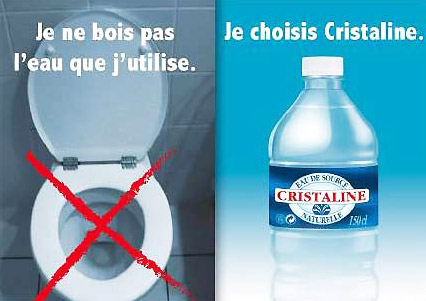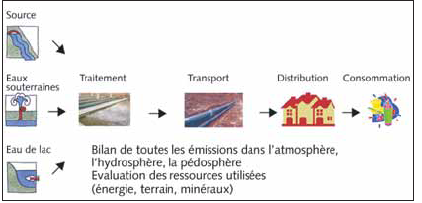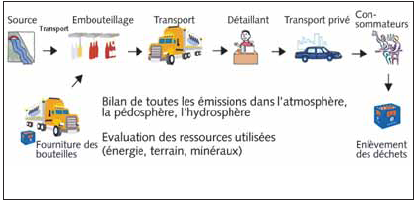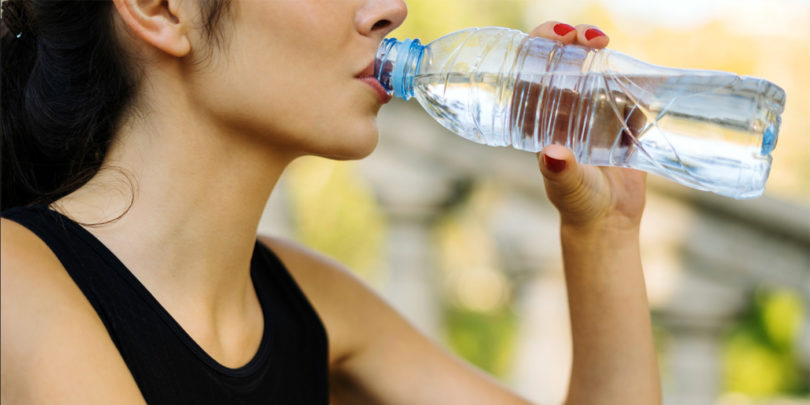Updated article : 26/01/2019
According to nutritionist Hélène Baribeau to stay healthy to drink between 1,5 and 2 L of water per day. It remains to know what water preferred, that of the tap or that of the bottles ?
According to Chambre Syndicale mineral waters, a French person consumes every year 125 L of bottled water (against less than 40 L in 1970). In 2016 this represented a consumption of 8,3 billion liters for the entire French population.
In 2006, the brand CRYSTAL launched the slogan “ Anyone who claims that tap water always tastes good should not drink it often ! » or « I do not drink the water I use » (see advert below) that caused a real controversy. The brand attracted a lot of criticism and was notably accused of wanting to scare consumers about the quality of tap water, which is one of the most monitored foodstuffs in France.. The tap water is also sometimes even more monitored than some bottled water.

We see here the main limits of consumption of bottled water that are the cost, the environmental impact and finally, We ask the question of whether bottled water is actually better for health.
The cost
The cost compared with the tap water is much higher. We believe that drink bottled water costs between 200 and 300 times more expensive than to drink water from the tap (This calculation is approximate because the price of water supply and the price of bottled water can greatly vary depending, respectively, of the region and the brand). We see immediately that the price differential is enormous and that consume bottled water is a luxury !
The environmental impact
According to the Swiss study “ Ecobilan drinking water - mineral water " produced by ESU-Services (expert office in life cycle analysis), the tap water is 1000 greener times only mineral water (bottled or cylinder) !
A diagram is worth a thousand words :

Source : From the source to the glass, the life cycle of drinking water

Source : From the source to the glass, the life cycle of drinking water.
A huge amount of energy and waste
In 2014, the France has produced 12 billion liters of bottled water more than double what had happened twenty years ago. In 2016 in the world, they are not less 480 billion plastic bottles which were produced (more than 15 000 bottles per second !).
This production is done with oil, a non-renewable energy. Huge amounts of oil used in the manufacture of plastic bottles, raw material that must be imported to the bottling plant, who will also consume energy for the manufacture of containers. Once conditioned, Water is routed over many kilometers by rail, ship or truck. A water bottle travels an average 300 km, bottling recycling.
It is completely absurd from an ecological point of view to find bottles Perrier or’Evian in Los Angeles in the US, for example, While the water flows from taps !

A very low life expectancy
A bottle of water, once in the hands of consumers, has an extremely low life expectancy ! Indeed, the content is quickly drunk and the bottle ends up in 44 % cases in the trash with household waste According to Eco-Packaging.
A very long degradation
A plastic bottle is not or is only marginally degradable naturally. It is estimated thata bottle puts between 100 and 1000 years to degrade in nature ! [6].
Unfortunately bottles still often end up in landfills. (in developing countries) and are thus buried underground in the best of cases or finish in the oceans. Cylinders degrade more quickly in the sea (with the salinity of water and solar radiation). These small fragments are swallowed by birds, fish, etc. contaminating the entire food chain and further causing slicks of viscous plastics. « Concern grows over the mountains of plastic accumulating in the environment. To the point that today there is a veritable ocean of plastic » [1].
After seeing only consume bottled water is both bad for the environment and for its portfolio, is it still benefits to drinking bottled water ?
Health impacts
Various plastics :

PETE or PET : Polyethylene Terephthalate
Mineral water bottles, soft drinks, fruit juices…
 HDPE : High density polyethylene (HDPE)
HDPE : High density polyethylene (HDPE)
Milk bottles, bottle stoppers…
 PVC or V : Polyvinyl chloride
PVC or V : Polyvinyl chloride
Bottles of mineral water, wine, vinegar, boxes food, food movies, vials, solvents…
![]() LDPE : Polyethylene low density
LDPE : Polyethylene low density
Food movies, trays, vials, freezer bag…
 PP : Polypropylene
PP : Polypropylene
Yoghurt pots, baby bottles, trays of butter and margarine…

PS : Polystyrene
Yoghurt pots, cutlery, plates and glasses plastic…

OTHER (Other) : Polycarbonate generally
Baby bottles, rigid plastic cups, food containers, plastic bottles (milk, ketchup, water, etc.)…
The problem of plastic incompletely
Categories 3, 6 and 7 are to be avoided !
3) PVC is considered hazardous to health and the environment. It contains lead, cadmium, of phthalates and DEHA.
Bis adipate (2-ethylhexyl), also known as DEHA, is a chemical that may cause cancer (study on laboratory animals), to have negative impacts on the liver, the kidneys, the spleen and bone formation [4] [5].
6) Polystyrene containing styrene is considered to be toxic to the brain and nervous system. It has adverse effects on the liver, the kidneys, the stomach and red blood cells.[2]
7) Plastics in this category may contain Bisphenol A (BPA), a disruptor. BPA migrates plastic to liquid in larger proportions when the liquid is hot and/or fatty.
We see that all plastics are not safe and must be wary when buying not only bottled water but also other foods packed with plastic. It is important to know what type of plastic affects your drink or food. In general, you will find these bottles on the background codes, containers, plugs, etc.
Plastic bottled water contains two times more hormones than tap water
According to a study by two German researchers, published in the journal Environmental Science and Pollution Research, the plastic release into the water of hormones (males or females) that we call endocrine disruptors. These hormones are likely to disrupt the reproductive functions of the man, even at very low doses. The study is made on 20 packaging of mineral waters in Germany that contain all of the PET (Polyethylene Terephthalate) and water in containers in glass in order to make a comparison. “In twelve of them, the researchers noted in the water from plastic bottles twice higher hormonal activity” [3]. This revelation immediately boosted industrial plastic which specify that the study does not conclude a health risk.
Conclusion
Even if the tap water is very uneven from one territory to another (water is in large urban areas controlled significantly more than in rural areas which further also a more water contaminated by agriculture), We see that consume bottled water night portfolio, to the environment, and “pourrait” harmful to health.
To know the quality of water from the tap in his region : Result of sanitary control of water quality
Furthermore, some alternatives exist :
- The filter jug (read the article : Filter jugs : a health hazard ?)
- The water softener (Article coming soon)
- The gravity filter (full test coming soon)
However, if you continue to drink bottled water, we recommend that you regularly change mark. Indeed, some of these waters contain a lot of minerals which can, in overdose, cause health problems. The waters as Volvic, Perrier and Evian, for example, have lower mineral content and better suited for daily consumption.
Similar articles :
- Initial analyses on the traces of drugs in water
- Filter jugs : a health hazard ?
- Our water is polluted and toxic
- Dangers and risks of Bisphenol A (BPA)
Main references :
[1]. Science and life – Plastic is fantastic
[2]. Smart Plastic Guide – Institute for agriculture and trade policy
[3]. The Figaro – Should we ban water in plastic bottles ?
[4]. The Government of Canada chemical substances Web site (www.chemicalsubstanceschimiques.GC.ca)
[5]. Technical Fact Sheet on Di (2-ethylhexyl) adipate.
[6]. Consoglobe.com
The quality of water packaged in France
SDWF (Safe Drinking Water Foundation in the Canada)
HANDLES (National Safety Agency)
Chambre Syndicale mineral waters
"LCA water - mineral water" conducted by ESU-Services (expert office in life cycle analysis)
From the source to the glass, the life cycle of drinking water
Technical specifications – The plastic bottle and plastic bottles (CEREMAP : Center for studies on recycling of plastics).

